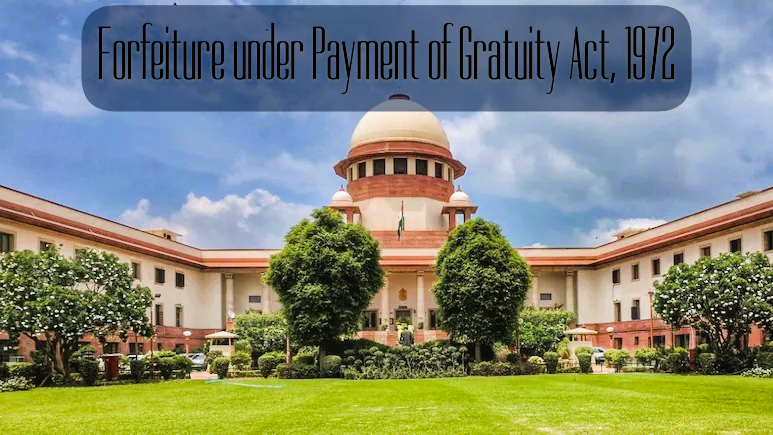Introduction
Gratuity is a statutory retirement benefit payable to employees under the Payment of Gratuity Act, 1972 (hereinafter the “Act”), designed to provide financial security upon cessation of employment. It serves as a financial safety net and a reward for an employee’s long and continuous service to an organization. While the Act generally mandates the payment of gratuity upon completion of five years of continuous service, it also provides specific grounds under which this benefit can be wholly or partially forfeited. The question of when and to what extent an employer can forfeit an employee’s gratuity has been a recurring legal challenge, with the Supreme Court of India offering crucial clarifications through its recent pronouncements outlining the conditions under which such forfeiture is legally sustainable.
The Statutory Framework: Section 4(6) of the Payment of Gratuity Act, 1972
Section 4(6) of the Act outlines the limited grounds on which an employee’s gratuity, either wholly or partially, can be forfeited:
- Section 4(6)(a): Where the services of an employee have been terminated for any act, willful omission, or negligence causing any damage or loss to, or destruction of, property belonging to the employer, the gratuity shall be forfeited to the extent of the damage or loss so caused. This provision ensures proportionality, allowing forfeiture only to the extent of the actual loss suffered by the employer.
- Section 4(6)(b): Where the services of an employee have been terminated for:
- (i) Riotous or disorderly conduct or any other act of violence on his part: This section covers serious misconduct that disrupts peace and order within the workplace.
- (ii) Any act which constitutes an offence involving moral turpitude, provided that such offence is committed by him in the course3 of his employment: This is the most frequently litigated ground and has been the subject of recent significant judicial interpretation.

The Evolving Judicial Landscape: A Shift from Criminal Conviction Requirement
For a period, there was ambiguity regarding the requirement of a criminal conviction for the forfeiture of gratuity under Section 4(6)(b)(ii), particularly following the Supreme Court’s decision in Union Bank of India and Others v. C.G. Ajay Babu (2018)1. This judgment was interpreted by some to imply that a criminal conviction was a prerequisite for gratuity forfeiture in cases involving moral turpitude.
“As per bipartite agreement between employer and employee – Forfeiture of gratuity permissible only in case of misconduct leading to dismissal caused financial loss to employer – Employee entitled for gratuity as no loss financial loss caused to employer bank.” Supreme Court in Union Bank of India and Others v. C.G. Ajay Babu (2018)1
“Forfeiture of gratuity is not automatic on dismissal from service – It is subject to sub-Sections (5) and (6) of section 4 of Payment of Gratuity Act, 1972.” Supreme Court in Union Bank of India and Others v. C.G. Ajay Babu (2018)1
As per the Union Bank of India and Others v. C.G. Ajay Babu (2018)1, for gratuity to be wholly forfeited under Section 4(6)(b)(ii), it was imperative that:
- The misconduct must amount to a criminal offence involving moral turpitude;
- Such offence must be committed during the course of employment;
- A formal conviction by a criminal court is necessary to establish the offence.
The Court reiterated that mere allegations of misconduct or internal disciplinary findings are insufficient to justify forfeiture unless backed by a criminal conviction, especially where moral turpitude is cited.
Current legal position
However, the Supreme Court has recently provided much-needed clarity on this aspect in the landmark case of Western Coal Fields Ltd. v. Manohar Govinda Fulzele (2025)2. This ruling significantly impacts the employer’s ability to forfeit gratuity for misconduct involving moral turpitude.
Key Takeaways from the Western Coal Fields Ltd. v. Manohar Govinda Fulzele2 Judgment:
The Supreme Court, in this pivotal judgment, has made the following crucial observations:
- Criminal Conviction Not a Prerequisite: The most significant clarification is that a criminal conviction is not necessary for the forfeiture of gratuity if the misconduct alleged and proved constitutes an offense involving moral turpitude. The Court explicitly overruled the interpretation that a criminal conviction was mandatory, clarifying that Section 4(6)(b)(ii) does not necessitate criminal proceedings for forfeiture.
- Departmental Inquiry Suffices: Forfeiture is permissible if the misconduct, which constitutes an offense involving moral turpitude, is proved in a departmental inquiry. The focus is on the nature of the misconduct and its proof through a fair internal process, not necessarily on a parallel criminal conviction.
- Moral Turpitude Determined by Disciplinary Authority: The Court emphasized that the disciplinary authority or the appointing authority has the discretion to determine whether the misconduct could, in normal circumstances, constitute an offense involving moral turpitude. While “moral turpitude” is not exhaustively defined, judicial precedents have identified it as acts against morality, integrity, and ethics, including financial misappropriation, criminal breach of trust, theft, and fraudulent activities.
- Proportionality in Forfeiture: The judgment underscores the importance of a proportionate approach when deciding the extent of gratuity forfeiture.
- In the case of Western Coal Fields Ltd., where the employee had secured employment by submitting a fraudulent birth certificate, the Supreme Court upheld the total forfeiture of gratuity, reasoning that the appointment itself was illegal.
- However, on forfeiture of gratuity, Appointing Authority must consider gravity of misconduct and adopt a balanced approach – In case of minor misappropriation, partial forfeiture of gratuity directed by the Apex court highlighting that the punishment should be commensurate with the gravity of the offense.
- Adherence to Natural Justice: Employers must still adhere to the principles of natural justice during departmental inquiries. This includes providing the employee with adequate notice and an opportunity to present their case on:
- The nature of the alleged misconduct.
- Whether the misconduct constitutes an offense involving moral turpitude.
- The extent to which the gratuity can be forfeited.
“…..forfeiture permissible if misconduct constitutes an offence involving moral turpitude, even without a
criminal conviction” – Supreme Court in Western Coal Fields Ltd. v. Manohar Govinda Fulzele2
Implications for Employers and Employees:
This recent Supreme Court ruling provides much-needed clarity for employers, empowering them to take decisive action against employees involved in serious misconduct that constitutes an offense involving moral turpitude, even without a criminal conviction. However, it equally places a significant responsibility on employers to ensure:
- Robust Departmental Inquiries: The departmental inquiry must be thorough, fair, and conducted in accordance with the principles of natural justice.
- Clear Policies: Employers should have clear policies outlining what constitutes misconduct warranting forfeiture and the process for such forfeiture.
- Careful Assessment of Moral Turpitude: The assessment of whether an act involves moral turpitude should be made judiciously, considering the specific facts and circumstances of each case, rather than arbitrarily.
- Proportionality: The decision to forfeit gratuity, and the extent of such forfeiture, must be proportionate to the misconduct and the loss caused.
For employees, this judgment serves as a reminder of the serious consequences of misconduct, particularly those involving moral turpitude. While gratuity is a hard-earned benefit, its entitlement is not absolute and can be forfeited under the prescribed legal provisions when grave misconduct is established through a fair process.
Conclusion:
The Supreme Court’s latest pronouncement in Western Coal Fields Ltd. v. Manohar Govinda Fulzele2 marks a significant development in the jurisprudence surrounding gratuity forfeiture in India. By clarifying that a criminal conviction is not a pre-requisite for forfeiture in cases of moral turpitude, the Court has streamlined the process for employers while simultaneously emphasizing the crucial need for due process, fair inquiry, and proportionality in all forfeiture decisions. This ruling reinforces the delicate balance between protecting employee rights and upholding accountability for serious misconduct within the workplace.
- Union Bank of India and Others v. C.G. Ajay Babu 2018 9 SCC 529
- Western Coal Fields Ltd. v. Manohar Govinda Fulzele2025 SCC Online SC 345
